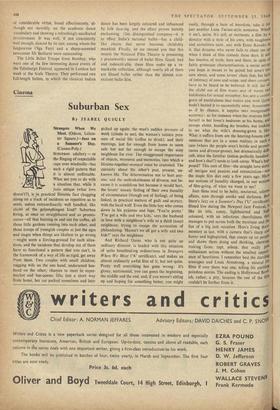Cinema
Suburban Sex
By ISABEL QUIGLY
Strangers When We Meet. (Odeon, Leices- ter Square.)—Jazz on a Summer's Day. (Cameo-Poly.) SUBURBAN adultery — or the flinging of respectable caps over windmills—has such a rigid pattern that it is almost unfilmable. What are you to do with a situation that, while it feels unique (what love doesn't?), is in practical filmable fact chugging along on a track of incidents so repetitive as to seem, unless extraordinarily well handled, like cliche of the galumphingest kind? Suburban living, at once so straightlaced and so promis- cuous—all that buzzing in and out for coffee, all those little gardens running into each other, and those troops of youngish couples at just the ages and stages when things are likeliest to go wrong —might seem a forcing-ground for such situa- tions, and the incidents that develop out of them have so functional a pattern that you can't, in the framework of a way of life as rigid, get away Nom them. Two couples with small children; nagging wife on the one hand, undersexed hus- band on the other; chances to meet in super- market and bus-queue; lifts, just a short way from home, her car parked sometimes and later
picked up again; the man's sudden pressure of work (clients to see), the woman's sudden pres- sure of social life (coffee to drink), and their meetings, just far enough from home to seem safe but not far enough to escape the nosy neighbour for ever. The exaggerated importance of objects, moments and memories, into which a lifetime-together-manqué must be crammed. The curiosity about the other's past, present, un- known life. The determination not to hurt any- one, and the unthinkableness of divorce, not be- cause it is scandalous but because it would hurt, the lovers' uneasy feeling of their own banality of circumstance (though not of feeling), of being linked, in practical matters of guilt and secrecy, with the local wolf. Even the little boy who comes down in his pyjamas and lisps, 'You're pretty.' 'I've got a wife and two kids,' says the husband in love with a neighbour's wife to a third (nosy) neighbour, trying to escape the accusation of philandering. 'Haven't we all got a wife and two kids'?' says the neighbour.
And Richard Quine, who is nOt quite an ordinary director, is landed with this situation of quite breathtaking ordinariness in Strangers When We Meet ('A' certificate), and makes an almost ordinarily awful film of it; but not quite. Pretty well everything has gone wrong: it's glossy, sentimental, you can guess the beginning, the middle and the end, and, if you weren't sitting up and hoping for something better, you might easily, through a haze of boredom, take it far just another Lana Turner-style nonsense. Which it isn't, quite. It's still, at moments, a film by a director with a style of his own, with toughness and sometimes taste. and with Ernie Kovaks in it, that dynamo who never fails to cheer me UP when I think of film comedy these days. It still has touches of truth, here and there, in spite of fairly grotesque characterisation, a social set-uP you hope is meant to be guyed but aren't too sure about, and some lovers' chats that, for lack of intimacy of tone and scope. and sheer coyness, have to be heard to be believed It ;till. for all the cliché use of film music and of laves and bulldozers for sexual metaphor. has lust a central grain of truthfulness that makes you wish Quaid hadn't buried it so successfully away Sometimes, as if by chance, it topples into recognisable accuracy : as for instance when the mistress finds herself in her lover's bedroom at his home, and snoops about, handling his brushes, but looking to see what the wife's dressing-gown is like• What it suffers from are the heaving-bosom con• ventions that are in a sense realistic in sucb3 case (where the people aren't brittle and prom's' cuous and divorce-prone), but dramatically dill!' cult, since the familiar (unless perfectly handled: and how's that?) tends to look corny. What's hap' pened? This sort of film—the straight love story' all intrigue and passion and renunciation—we the staple film diet only a few years ago. Have our notions of banality changed, or our notions of film-going, of what we want to see?
Jazz films tend to be hefty, nocturnal, solemn affairs, seen through smoke and darkness. Berl Stern's Jazz on a Summer's Day ('U' certificate), filmed live during the Newport Jazz Festival, is like its title, sunny, lighthearted and high coloured, with an infectious cheerfulness that manages to put across both the mystique and the fun of a big jazz occasion. Here's living dais; mentary at last, with a camera that's sharp and funny and highspirited, that creeps up on people and shows them doing and thinking, chewing' making faces, rapt, asleep, that really Pals enthusiasm across without the smallest appear ance of heartiness. I remember best the dazzling seascapes and Louis Armstrong. a natural fat films if ever there was one, telling his ambling pointless stories. The ending is Hollywood Bowl• ish, rather; a pity, because the rest of the fillsi couldn't be farther from it.














































 Previous page
Previous page